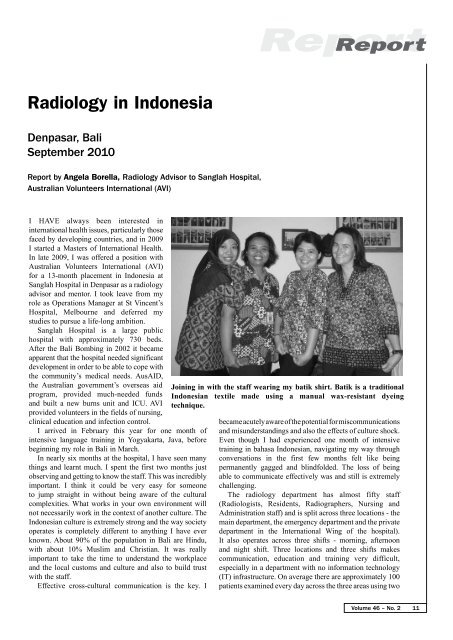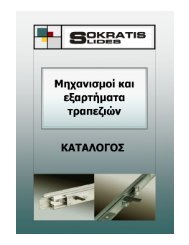isrrt Newsletter Volume 6. No.2 - 2010
You also want an ePaper? Increase the reach of your titles
YUMPU automatically turns print PDFs into web optimized ePapers that Google loves.
Report<br />
Radiology in Indonesia<br />
Denpasar, Bali<br />
September <strong>2010</strong><br />
Report by Angela Borella, Radiology Advisor to Sanglah Hospital,<br />
Australian Volunteers International (AVI)<br />
I have always been interested in<br />
international health issues, particularly those<br />
faced by developing countries, and in 2009<br />
I started a Masters of International Health.<br />
In late 2009, I was offered a position with<br />
Australian Volunteers International (AVI)<br />
for a 13-month placement in Indonesia at<br />
Sanglah Hospital in Denpasar as a radiology<br />
advisor and mentor. I took leave from my<br />
role as Operations Manager at St Vincent’s<br />
Hospital, Melbourne and deferred my<br />
studies to pursue a life-long ambition.<br />
Sanglah Hospital is a large public<br />
hospital with approximately 730 beds.<br />
After the Bali Bombing in 2002 it became<br />
apparent that the hospital needed significant<br />
development in order to be able to cope with<br />
the community’s medical needs. AusAID,<br />
the Australian government’s overseas aid<br />
program, provided much-needed funds<br />
and built a new burns unit and ICU. AVI<br />
provided volunteers in the fields of nursing,<br />
clinical education and infection control.<br />
I arrived in February this year for one month of<br />
intensive language training in Yogyakarta, Java, before<br />
beginning my role in Bali in March.<br />
In nearly six months at the hospital, I have seen many<br />
things and learnt much. I spent the first two months just<br />
observing and getting to know the staff. This was incredibly<br />
important. I think it could be very easy for someone<br />
to jump straight in without being aware of the cultural<br />
complexities. What works in your own environment will<br />
not necessarily work in the context of another culture. The<br />
Indonesian culture is extremely strong and the way society<br />
operates is completely different to anything I have ever<br />
known. About 90% of the population in Bali are Hindu,<br />
with about 10% Muslim and Christian. It was really<br />
important to take the time to understand the workplace<br />
and the local customs and culture and also to build trust<br />
with the staff.<br />
Effective cross-cultural communication is the key. I<br />
Joining in with the staff wearing my batik shirt. Batik is a traditional<br />
Indonesian textile made using a manual wax-resistant dyeing<br />
technique.<br />
became acutely aware of the potential for miscommunications<br />
and misunderstandings and also the effects of culture shock.<br />
Even though I had experienced one month of intensive<br />
training in bahasa Indonesian, navigating my way through<br />
conversations in the first few months felt like being<br />
permanently gagged and blindfolded. The loss of being<br />
able to communicate effectively was and still is extremely<br />
challenging.<br />
The radiology department has almost fifty staff<br />
(Radiologists, Residents, Radiographers, Nursing and<br />
Administration staff) and is split across three locations - the<br />
main department, the emergency department and the private<br />
department in the International Wing of the hospital).<br />
It also operates across three shifts - morning, afternoon<br />
and night shift. Three locations and three shifts makes<br />
communication, education and training very difficult,<br />
especially in a department with no information technology<br />
(IT) infrastructure. On average there are approximately 100<br />
patients examined every day across the three areas using two<br />
<strong>Volume</strong> 46 – No. 2 11

















